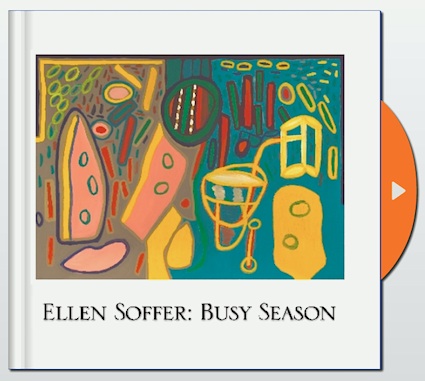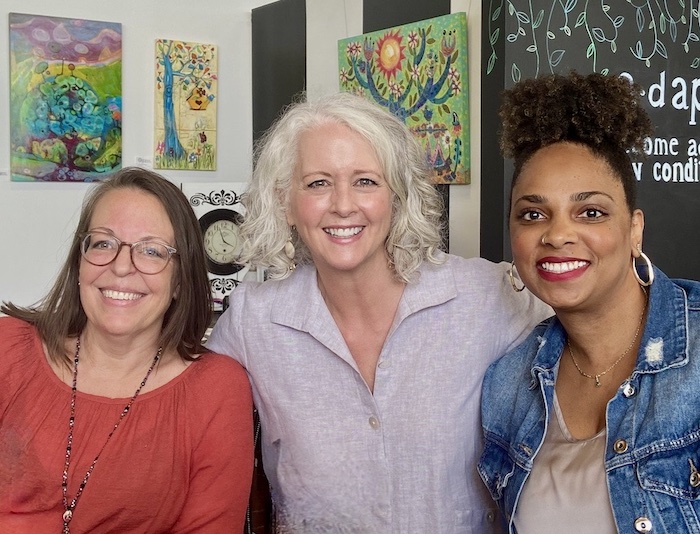
You’re lucky to live in an age where you can upload images and text and have a catalog printed through Lulu or Blurb and delivered to your doorstep within a couple of weeks.
But what do you do with it?
How do you use a published catalog to promote your art more effectively?
What do you do with a catalog of your art? < Deep Thought Thursday
- Alyson Stanfield
Share this post
Short Workshop
ELEVATE YOUR ART
Museum-Quality Standards That Command Higher Prices
Give me 90 minutes for practical tips and a major mindset adjustment.



12 thoughts on “What do you do with a catalog of your art? < Deep Thought Thursday”
First comment! Woot! (I’ve had a bit too much coffee)
I have several Blurb books. Some I sold at open studios, some were produced just for showing off. To be honest, I did a small ‘portfolio’ type book to send to galleries but haven’t used it. I just haven’t found any galleries yet, at my level and just above, who want anything other than digital images – and they often specifically say not to send anything in the post. In person I’m finding my iPod image gallery the most useful. Still, I paid for a large hardcover book just last month that I’m putting out at my open studios and other events like art fairs – I do think potential buyers like seeing the history of work and consistency of output. It gives them some faith in the artist.
This is a question I’m pondering at the moment. I’m doing Open studios for the first time next month and catalogues are something I’m planning.
Although I’m thinking of them more as an Art Book and a way to encourage people who can’t afford a painting, but would like something.
Yes yes!! It’s such an exciting time. And, these are on my list of many things to do. You could just have one to carry about – and show it as needed or asked.
Maybe little ones to give to fans that purchase your work, giveaways, etc.
Thanks for posting my catalog Alyson!
Nice catalog Ellen!
I love your style/colours.
My experience living in Spain is that galleries expect you to have a catalog from your last show. So, it is very important to try to work with galleries that will make a catalog for you. Having said that, it is expensive and right now less galleries are producing them. A catalog that you make yourself, doesn’t carry the same weight, but you have the liberty of making something more original than the standard catalog produced by galleries. I have both types of catalogs: one a gallery made, and two I have made myself. I use them both for sending my info out in gallery packets. European galleries tend to accept them, US galleries sometimes don’t want to receive info in the mail (until they ask you for more info).
I’ve learned two things about catalogs over the years. One, the material is dated and you may end up with a stack of catalogs that a few years later may not be the first thing you want to show a gallery you are introducing to your new work. Two, although it’s a great idea to have catalogs available at a show, some galleries won’t use them because they don’t have the gallery info printed on them (i.e. the gallery wants people to call them and not you). Thus, I can see how using them in your own open studios would work better.
I do think that a catalog effectively shows a body of work created for a specific purpose. It can leave a good impression. Just like making postcards, the trick is to know how many to make and exactly what you want to use them for. Considering that now they can be printed on demand (with Blurb), it seems easier to control the quantity to not end up with too many.
Honestly, the times I have used a catalogue, is, well, as a catalogue…What I mean is, is that I flipped the pages while standing beside a gallery owner, & they said, “oh, I like that one”, “Can you bring that one in?” kind of thing…I used it as a pictorial inventory of what was available- which is what they were most interested in- not really what wasn’t (they weren’t too interested in a history)…I have been doing this digitally lately(sending pics by email), since I find it depressing to print these things out- for some reason they look dated to me so quickly…
thanks for asking this question Alyson! I have this on my list as well and have such an urge to create something. The responses here have increased my inspiration and ideas. I, also, am thinking of something more like an art book ~ with process and studio pics, sketches, journal entries ~ something I can possibly give to those who buy large originals, and also offer for sale. I also like the idea of a thinner, paperback catalog/book that can be offered free of charge to interested parties. This is so attractive to me. For some reason I am fighting feelings that something like this would be “self-serving” but that is crazy ~ right? People want to see behind the scenes in regard to the art and the artist. Right? 🙂
Can you create a finished PDF e-book, then upload it page by page into Blurb for printing?
Thanks again!
Sincerely,
Katie m. Berggren
I just did one of those books about my fellow graduating art students. We used ours to promote our work to galleries and sold them to the school and to others. I think it would be interesting to make one just for myself some time.
April – yes, you can make a pdf yourself and then upload it to Blurb. You will need to download Blurb’s own templates for it, or work to their sizes. But I have created a few in InDesign and then just used the pdf as I wanted, including for a Blurb book. 🙂
Katie made me think why I don’t do proper catalogues actually… my galleries and agents use my website for that purpose. They know it contains my latest work, that individual pages don’t have my contact info, and prices are gallery prices. So they’re happy to browse that and ask for higher res images or even show the site to the customer in the shop.
Hi Alyson,
Every time I go to a show in a gallery I take along a book of my work. I can have quite lovely books made very inexpensively by my local printer, and feature the work in the show, and any other work I am proud of, and have decent photos of at the time. I used to make portfolios with printed images stuck in sleeves. They were awkward and not professional looking. My current printer is a designer too, and very good at it. I have had excellent reaction to my little books from galleries. Another nice thing to do is to make one of these books of photos for a major show. When I showed with a friend last June we sat the show ourselves for a week. It was warm and we had so many visitors to the gallery, so I asked permission to take photos, then made my friend a book at the end of the show of the photos from the opening and from the week. She loved it.
Thanks for this,
Barbara
I just ran across this post. I’m creating a book right now to upload to Lulu.com. I thought Blurb was too expensive. I’m not quite sure what option to use yet. I have started it on their website using their quick start method which is fairly simple. I’m also using Word for my text. I’m pretty good with InDesign so wonder if I should go that route. But anyway, it seems important for me right now to create a history of where my painting has taken me up until now. I tend to paint in series so this is how I will organize my book. I was thinking it would be good to give to galleries but after reading the comments, I guess I won’t be using it for that. So, I think it will end up on my own art shelf and maybe with family members. It might get shown along the way to others. I don’t know. All I know is it is important for me to document my history of paintings and like Katie above says “I, also, am thinking of something more like an art book ~ with process and studio pics, sketches, journal entries. In the end, I guess it’s just for me. And that is okay.